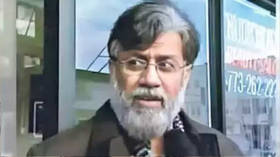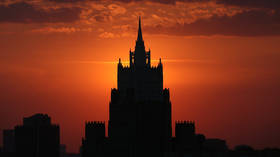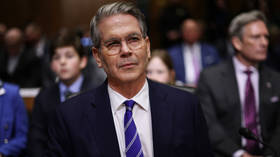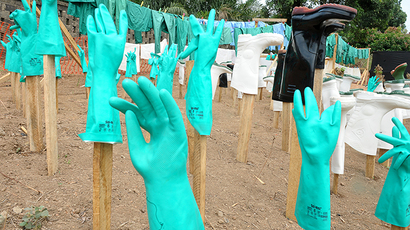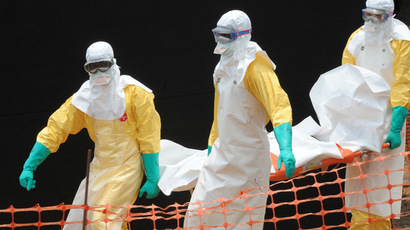Ebola outbreak in W.Africa ‘totally out of control’ – MSF
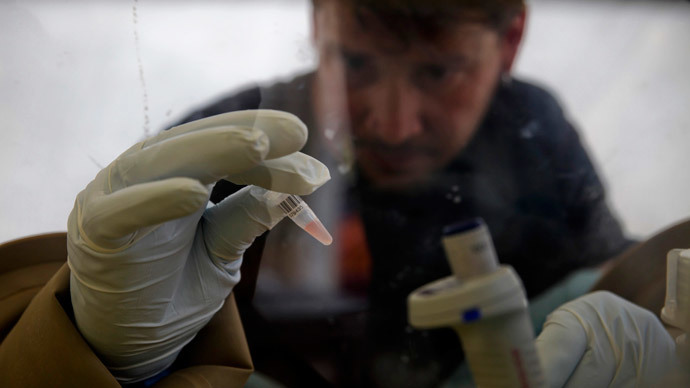
West Africa is going through the second wave of Ebola outbreak and the deadly virus is now “totally out of control,” a senior official at Médecins Sans Frontières said.
More than 330 people have died in Guinea, Sierra Leone and Liberia since the Ebola disease sprang up in Africa at the beginning of this year, according to the latest figures released by the World Health Organization (WHO).
'Most challenging' deadly disease outbreak: WHO speaks out on Ebola dangers
The director of operation for Médecins Sans Frontières (MSF), Bart Janssens, told the Associated Press Friday that the medical group is struggling to cope with the outbreak and is stretched to the limit in its ability to respond.
International organizations as well as the governments involved need to increase public education messages about the disease and send more health experts into the field, he said.
“The reality is clear that the epidemic is now in its second wave. And for me, it is totally out of control,” Janssens concluded.
Ebola is a haemorrhagic fever with a fatality rate of up to 90 percent. Chances of survival are higher is patients seek professional medical help as soon as symptoms become apparent.
Symptoms begin with a fever and throat and muscle pains and then develop into nausea, vomiting and diarrhea, which is accompanied by the decreased functioning of the liver and kidneys. Many people at this stage also have problems with bleeding.
The only treatment available is either by oral rehydration therapy or intravenous fluids but only about 10 percent of people infected survive and there is no vaccine.
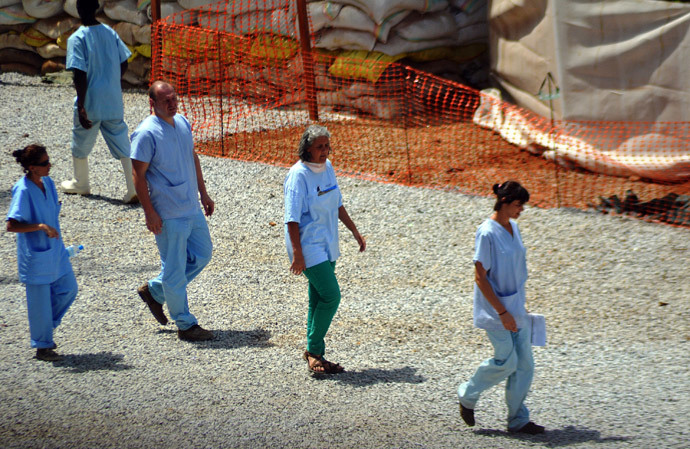
Initially the outbreak was slow to take hold, but it has picked up speed in recent weeks and has spread to the Liberian capital Monrovia for the first time.
“I’m absolutely convinced that this epidemic is far from over and will continue to kill a considerable amount of people, so this will definitely end up the biggest ever,” he added.
Fadela Chaib, a spokesman for the WHO echoed Janssens concern and said that the multiple locations of the outbreak and its movement between countries in the region make it one of the most “challenging Ebola outbreaks ever.”
The outbreak is particularly problematic because it has hit an area where people are highly mobile and then spread to areas of dense population, like the capitals of Guinea and Liberia.
The epicenter of the outbreak was the Guinean city of Gueckedou, a major regional transport hub. Past outbreaks of the disease have hit sparsely populated areas in east or central Africa.
Janssens said that the only way to stop the diseases rapid spread is to change people’s behavior and that is proving difficult to do.
“There is still not a real change in behavior of the people. So a lot of sick people still remain in hiding or continue to travel. And there is still news that burial practices are remaining dangerous,” he said.
Part of the reason for this, he said, is that the governments of the countries effected do not realize the gravity of the situation and he said the WHO is not doing enough to push leaders to take the required action.
“There needs to be a real political commitment that this is a very big emergency. Otherwise, it will continue to spread, and for sure it will spread to more countries,” said Janssens.
But Liberia’s deputy minister of health, Tolbert Nyenswah, said that officials at the highest level of government in Monrovia are working to try and contain the outbreak and insisted that the fact that only a few new cases were recorded in Liberia before the onslaught of the second wave was proof of this.
The problem is exacerbated by the fact that the disease has struck in some of the world poorest nations, where public health systems are badly equipped and fragile.
Janssens said the MSF are struggling to cope and the organization is operating at its limit with 40 international staff on the ground in four treatment centers, while more effort is needed. He stressed that some have already done three tours on the ground and there is no more experienced staff to call on.
Unni Krishnan, who heads disaster preparedness and response for Plan International, which is providing equipment to the affected areas, also said that governments and international organizations were far from winning the battle against the Ebola outbreak.
“The affected countries are at the bottom of the human development index. Ebola is seriously crippling their capacities to respond effectively in containing the spread,” he told AP.
It was reported last month that Ebola has spread to neighboring Sierra Leone, where more than twelve people are now confirmed to have died from the disease.




